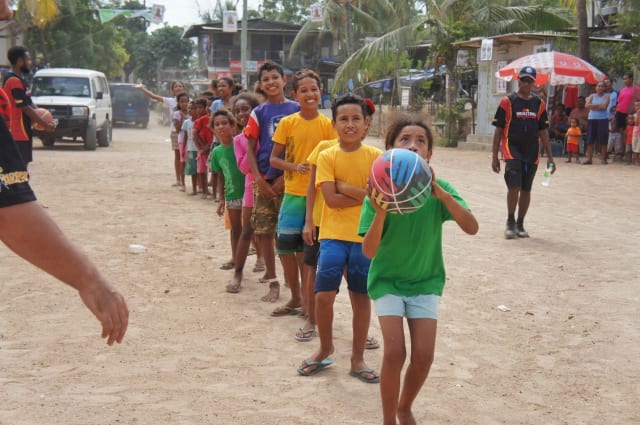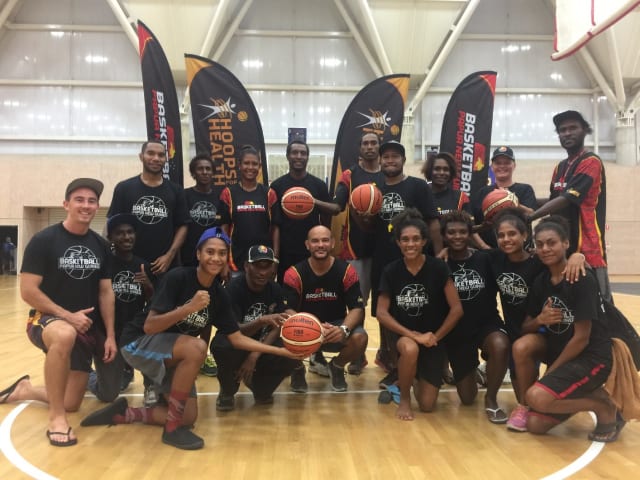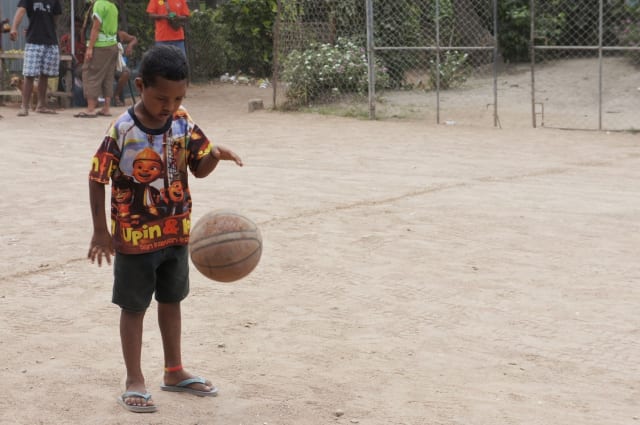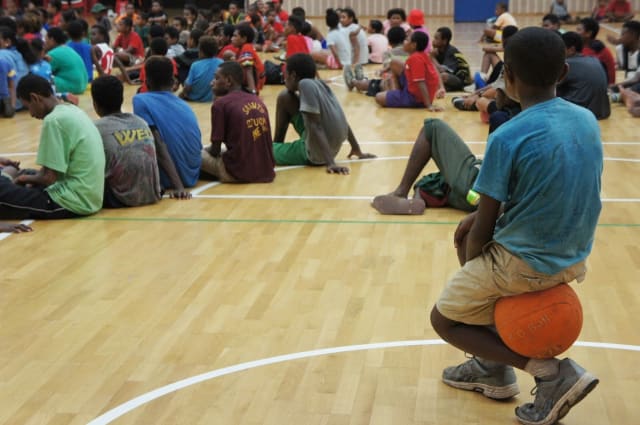Patrick Ani building on pathways to the future in Papua New Guinea
PORT MORESBY - Patrick Ani has come a long way since he stuck a home-made backboard and ring onto a tree in his backyard to create extra scrimmage options for him and his Papua New Guinea mates.
PORT MORESBY - Patrick Ani has come a long way since he stuck a home-made backboard and ring onto a tree in his backyard to create extra scrimmage options for him and his Papua New Guinea (PNG) mates.
Beside the 35-year-old PNG High Performance Coordinator's goal of building his nation into a FIBA Oceania powerhouse, sits a burning desire to cut into youth crime rates in Port Moresby and to nurture positive well-being in his community.
Noble goals indeed and not necessarily mutually exclusive, considering the fact he successfully avoided succumbing to crime himself by staying engrossed in sport.
Sport and a strong sense of community have guided Ani's life, probably as a result of being from a large family, his father having four brothers and nine sisters.
"I have a really huge family - four uncles, nine aunties," he said. "As a kid, dad got me into sport. He was head coach for our soccer team from U6 through to U12 and we became the primary school champions.
"In the sporting world, I've always been very competitive. Dad didn't really play sport but he was into it. Mum was very athletic. She played netball, taekwondo, indoor cricket, so I think she passed some of her genes on to me as well. She's from the gulf of PNG, so we used to end up going to indoor cricket and watching her do her stuff."
"Dad used to play darts," Ani went on, adding with a smile that darts is a recreation he probably will immerse himself in "later on in life."
Basketball and the many doors it would open, was just around the corner.

"Basketball began as soon as I hit high school. It was 'in,'" he recalled. "We always used to play, every day, get there at 7, hit the courts and it became part of us."
Ani showed a natural flair for it too, reaching national level very quickly.
"We used to have a big old rain tree in the middle of our back yard. I stuck up a ring with a backboard, sticking out of the rain tree and you know that mesh you use for laying cement? We just cut a wad off and we made a hoop and stuck it up on the backboard, just to have some scrimmage matches there," he explained.

From there it was on to the local teacher's college and a real court. Part of the Exodus Basketball Club, his team was "a bunch of young guys, a bunch of unknowns who didn’t have any basketball history."
That soon changed as they became a prominent fixture at the Capital Basketball League in Port Moresby.
"We came up through the ranks, then we made it to the regionals, won the regionals and the rest is history," Ani summed up in talking of one of PNG's most prominent clubs.
In 1997, as a 15-year-old, Ani made the Papua New Guinea U22 team that competed in Noumea, opening his eyes "to what basketball could be."
"The fire was lit."
He continued to win PNG national selections consistently through to 2009 for the Indigenous All-Stars Weekend in Cairns, Australia.
That fire became a raging inferno as he aspired to make the sport mean more in his country, adding coaching to his repertoire and administration too as PNG's High Performance Coordinator.
He's been involved in coaching since 2010 - following the birth of his son - having started with U15 and U17 as his interest in playing steadily dwindled.
By 2012, he was assistant coach of the U19 PNG men's team which competed in Melbourne and a year later, assisted the U19 Oceania Men's Pacific All-Star team which competed in Albury, New South Wales for the Australian Junior Country Cup.
"We came out on top but our boys were too old," he pointed out. "It was U18 and we had boys from Fiji, New Cal, across the Pacific, Samoa. It was a group of boys selected from FIBA Oceania."

Ani's talents were recognised by FIBA Oceania's officials, including Secretary General David Crocker and Development Manager Annie La Fleur. He was brought to Australia for the first time to attend the High Performance Coaches Workshop on the Gold Coast. More workshops and clinics followed, Patrick being a fast learner.
Appointed coach of the PNG U15 boys team for the historic first U15 FIBA Oceania Cup playd in Port Moresby last December, he could not be more excited about it.
"The tournament is open to Australia, New Zealand and all the island countries will be in attendance," he said. "It's a pretty massive event and never been done before in Oceania - this first junior tournament. And it’s at home so it will be big. We'll see how we go."
Ani will also assist with the PNG U15 girls team.
"The coach is based down in Brisbane so I'll be assisting to condition and train the athletes," he explained. "The tactical stuff and strategies will come up when the coach is here."
Last October, Joel Khalu was Chief Executive Officer of PNG Basketball. The coach of Australia's Apunipima Australian Indigenous All Stars had experience running Midnight Basketball programs in Cairns and believed a similar initiative would work in Port Moresby where crime, and in particular teenage and youth crime, is wildly rampant.
With the full support of PNG's Basketball Federation's executive, Khalu helped initiate Twilight Basketball, a six-week program on Friday nights playing in the six-court facility built in 2015 for the Pacific Games.
The initiative was part of FIBA Oceania's greater "Basketball for Good" strategy, supporting the growth of basketball and communities in the Pacific. It also was made possible through the support of the International Basketball Foundation (IBF) and the Australian Government's Pacific Sports Partnerships program.
"Twilight Basketball was one of the community engagement programs we ran under the Hoops For Health program, delivered through FIBA Oceania," Khalu said. It operated off a similar premise to Midnight Basketball, with the emphasis on encouraging a healthy lifestyle, social cohesion and educating kids on being active and healthy.

"Twilight Basketball is more about diversionary stuff, getting kids off the streets and away from the temptations of criminal activity," he explained. "We didn't know what to expect but the reaction was phenomenal. Kids were rolling up at 3pm and sitting in the stands, waiting for the 6 o’clock start. There’s no question they love their basketball."
Ani was the first to volunteer to help coordinate and run the program, which features 5-on-5 teams of children aged up to U15, then a second session for older youths playing 3-on-3 games across the six-court facility.
"From Day One, I kept on volunteering for it," he recalled. "Joel implemented some great stuff up here which needs to live on. He started Twilight Basketball with the help of Steven Knight in Melbourne who works for the AFP (Australian Federal Police).
"We also had a researcher from the University of PNG come up here on Friday nights. Her research indicated most of the areas where these kids are from are the biggest crime units in Port Moresby. So we're contributing to some positivity around the community."
When the six-week program ended, ancillary programs such as 'Mum's a Hero' and 'Hoops For Health' promoting positive living, continued.
But Twilight Basketball's impact was mind-boggling.
"Just for the juniors alone - from the U15s, we've got 10s, 13s and 15s - about 500 kids would be there. And there are adults too and some bigger kids, so between 500 and 700. They don't all come in and stay at once because of the age limits," he pointed out.

"It's awesome, and they're still asking for it. When you walk down the street here, the kids are like: 'Hey coach. When's Twilight?' It's built some good credibility. There's actually kids who come in on holidays and shoot around and play hoops and ask when’s the next program?"
Other regions such as Lae in the Morobe Province and the autonomous region of Bougainville are now imploring Ani to bring programs such as Twilight Basketball to them.
"They read about it and they want it," he said, and playing on outside courts is no drawback. "At the end of the day, it doesn't matter whether it’s outside or inside - these guys play rugby in a field so it’s just that sense of belonging and the kids are learning the development stuff which contributes to the community."
It also has served to promote understanding and a bridge between youths and the police.
"When we go out to the schools, the police provide security and they get into some shorts and shirts and shoot around with the kids. It's pretty good engagement for them to meet the schoolkids," he said.
With sport having kept him from the streets, he is a firm believer in its value toward avoiding a life of crime.
"Definitely. You’re there, you're part of a unit, you have one goal, you have something to do. I've lost one of my best players to crime, I've lost a very close mate to crime. There's a path you can take, sometimes it's going to be hard but you always have a choice," he reasoned.

Khalu says Ani is a wonderful role model who started at the grassroots and is a humble, community-minded person who loves the game.
"I've known him for about 10 years," Khalu said. "We would run a tournament each year when PNG sides would come down to play teams in Cairns and he was a player in those teams. His playing pedigree is very high.
"I had him as my PNG U18 team assistant coach in 2016 and as my assistant coach with the PNG senior men's national team in 2017. There's not too many like him who go through and then want to give back to the game."
Ani knows no other way and PNG basketball is all the better for it. He could have stayed in IT after earning his computer studies diplomas and transitioning from dragging cables in the roof to being an analyst.
But then…
"This job came up, High Performance Development Officer - same concept, different methodology. You're building systems, making tweaks to make it better," he explained. "We want to have podium finishes for every event we attend."
Facilities, virtually non-existent when he was playing in the early 90s, are a big priority.
"That’s the big picture and I can help in my capacity at high performance," he said. "Ultimately I'm looking a bit further down the line. I'd like to get a team into the World Cup and Olympics and it begins with these boys who will be participating at the end of the year. FIBA has provided a pathway that we can go and I'd like to drive that, with the federation and all the executives on board.
"That's some 40-odd weeks away, then we've got the Pacific Games coming up next year and then the U17 and U15 Asia Cup, so just to get into that niche of the top finishers, that’s the goal.
"From where we started, playing under a tree in the backyard, now we can make it on the world stage and be dominant in the Oceania region. That would be the ultimate aim."
And quite the dream realised for Patrick Ani.
Follow Boti Nagy on Twitter at @boti_nagy and at botinagy.com.
FIBA